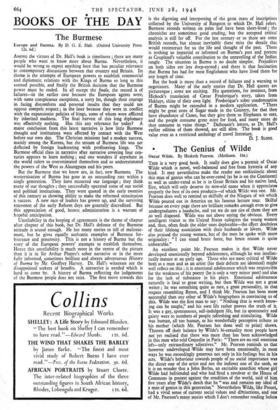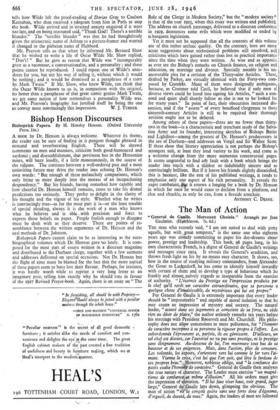• The Genius of Wilde
Oscar Wilde. By Hesketh Pearson. (Methuen. 16s.) THIS is a very good book. It really does give a portrait of Oscar Wilde which is novel, well-balanced and free from hysteria of any kind. It may nevertheless make the reader too enthusiastic about this man of genius who can be over-rated (as he is on the Continent) as well as under-rated as he is in Great Britain and his native land, Eire, which will only deserve its new-old name when it appreciates properly the best of its own products—of which Wilde was one. Mr. Pearson does well to remind us skilfully of the Niagara of wit which Wilde poured out in America on his famous lecture tour. Skilful because on every page there are brilliant remarks enough even to give undergraduates a headache, and yet we do not tire of them they are .so well disposed. Wilde was not above saying the obvious. Every intelligent visitor to the United States eulogises the young women and, thus, often finds the older ones deplorable—the effect doubtless of their lifelong association with their husbands or lOvers. Wilde also praised the young women, but of the men he spoke with more originality: " I can stand brute force, but brute reason is quite unbearable."
An excellent point Mr. Pearson makes is that Wilde never developed emotionally beyond adolescence, although he was intellec- tually mature at an early age. Those who are most critical of Wilde both as a man and as an artist (for their defects are identical) might well reflect on this ; it is emotional adolescence which was responsible for the weakness of his poetry (he is only a very minor poet) and also for the lack of substance in his plays. Emotional adolescence naturally is fatal to great writing, but then Wilde was not a great writer ; he was something quite as rare, a great personality, in that respect resembling Byron, and I think Mr. Pearson has been more successful than any other of Wilde's biographers in convincing us of this. Wilde was the first man to say: "Nothing that is worth know- ing.can be taught," and his own life rather proves the truth of it. It was a gay, spontaneous, self-indulgent life, but its spontaneity and gaiety were to numbers of people refreshing and stimulating. Wilde was human, all too human, as his wonderfully perceptive tribute to his mother (which Mr. Pearson has done well to print) shows. Thrown off their balance by Wilde's bi-sexuality most people have not yet realised that there was more than has been acknowledged in this man who told Coquelin in Paris : "There are no real emotions left—only extraordinary adjectives." Mr. Pearson reminds us that however undeveloped .Wilde may have been emotionally, in most ways he was exceedingly generous not only in his feelings but in his acts. Wilde's behaviour towards people of no social importance was the direct one of the artist and not the indirect one of the snob, so it is no. wonder that a John Barlas, an excitable anarchist whose girl Wilde had befriended and who had fired a revolver at the House of Commons in protest against the condition of the world, said of him five years after Wilde's death that he " was and remains my ideal of a man of genius in this generation." Nevertheless Wilde, like Proust, had a vivid sense of current social values and distinctions, and one of Mr. Pearson's many stories which I don't remember reading before tells how Wilde left the proof-reading of Dorian Gray to Coulson Kernahan, who then received a --telegram from him in Paris to stop the book. Wilde arrived and in strained anxiety enquired if it were too late, and on being reassured said, "Thank God! There's a terrible blunder." The "terrible blunder " was that he had thoughtlessly given the aristocratic name of Ashton to a picture-framer and wanted it changed to the plebeian name of Hubbard. Mr. Pearson tells us that when he informed Mr. Bernard Shaw that he wished to write a life of Oscar Wilde Mr. Shaw replied, " Don't! " But he gave as reason that Wilde was " incomparably great as a raconteur, a conversationalist, and a personality ; and these points cannot be reproduced? I- could repeat one of Wilde's anec- dotes for you, but not his way of telling it, without which it would be nothing ; and it would be dismiised as a paraphrase of a story by Mark Twain." If Mr. Shaw, who knew Wilde, can think that the Oscar Wilde known to us is, in comparison with the original, no better than a paraphrase of that great comic genius Mark Twain, we get some notion of how tremendous a personality Wilde was. and Mr. Pearson's biography has justified itself by being the one to convey most convincingly this impression. W. J. TURNER.































 Previous page
Previous page